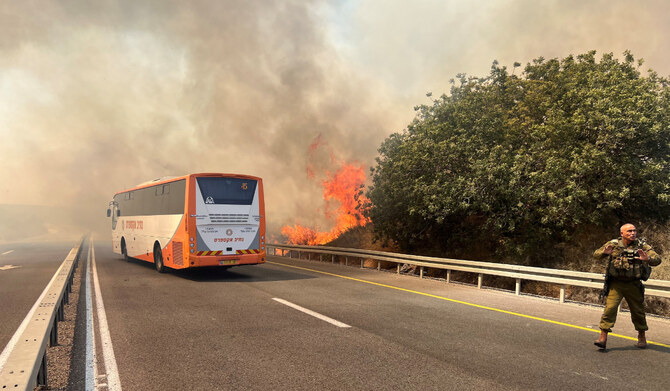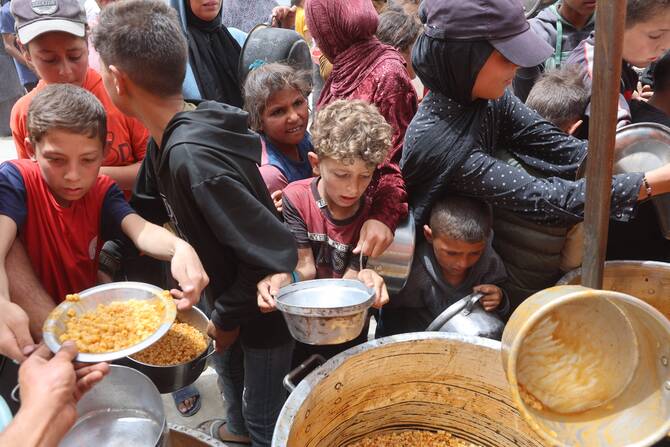BEIRUT: Hezbollah launched a swarm of assault drones on Filon Base — the headquarters of Israel’s 210th Division — and its warehouses in the southeast of Safed on Friday, the second attack on Safed in less than 12 hours.
Hezbollah said it had “targeted the positions and locations of the base’s soldiers and officers, striking them directly.”
Israeli media outlets confirmed the attack, stating that “20 rockets were launched from Lebanon toward Safad.”
FASTFACT
UN Humanitarian Coordinator for Lebanon Imran Riza announced the allocation of $24 million as an aid package from the Lebanon Humanitarian Fund ‘to support the country’s most vulnerable groups.’
This came hours after Israeli raids on Friday morning that targeted several houses in Bint Jbeil, the largest city in the area of the Israel-Lebanon border. The impact of the explosions destroyed some residential buildings and caused damage to other structures.
The Israeli army also raided the outskirts of Yaroun and Aita Al-Shaab, with heavy artillery targeting the forests of Alma Al-Shaab and the outskirts of Kfarshouba.
Israeli forces also targeted two motorcycles in Nabatieh on Thursday night, killing three people, including a four-year-old child identified as Mehdi Mubarak, along with his father, Sadeq Mubarak from Markaba, and Sajed Mustafa, Hezbollah announced.
Hezbollah immediately responded by targeting a major air-defense base in Safad with dozens of Katyusha missiles, setting parts of it ablaze and leading to a complete power outage in Safad and nearby areas. Around 50,000 settlers fled to shelters after hearing the sound of sirens, according to Israeli media outlets.
European and US calls to prevent the expansion of war in Lebanon have yet to have any effect.
In his Friday sermon, the head of Hezbollah’s Shariah Council, Sheikh Mohammed Yazbek, said “An eye for an eye, a tooth for a tooth, and the initiator is the aggressor.”
He added: “Hezbollah stands up to the Israeli enemy’s attacks, the monstrous and destructive bombing of houses, and killing of civilians, by launching rocket and drone operations against more settlements.”
Yazbek highlighted “the Israeli escalation,” and said that Hezbollah “is fully prepared to teach the enemy a lesson it hasn’t dreamed of, and won’t stop before the attack against Gaza stops.”
Israeli media outlets reported on Thursday night that the US presidential envoy to Lebanon and Israel, Amos Hochstein, will head to Israel with a message calling for it to avoid “carrying out an expanded military operation in Lebanon.”
The Lebanese authorities have yet to receive confirmation of whether Hochstein intends to visit Beirut.
According to Information International, the death toll from confrontations on the southern front between Oct. 8, 2023, and the morning of Sept. 13, 2024, was 626. Among them are 431 Hezbollah members and 97 civilians. A total of 2,050 homes have been completely destroyed, 1,800 homes have been partially destroyed, and around 8,000 homes have suffered minor damage, while more than 110,000 people have been displaced, with many losing their livelihoods.
Meanwhile, UN Humanitarian Coordinator for Lebanon Imran Riza issued a statement announcing the allocation of $24 million as an aid package from the Lebanon Humanitarian Fund “to support the country’s most vulnerable groups, and address the needs of those affected by the escalating hostilities in southern Lebanon.”
Riza said: “As the escalation of hostilities in south Lebanon drags on longer than we had hoped, it has led to further displacement and deepened the already critical needs. The long-term consequences on vulnerable groups are particularly worrying — schools are closing, healthcare services are under strain, and basic services are being stretched thin.”
He continued: “We are allocating these funds from the LHF at a time of unprecedented challenges. Lebanon is grappling with multiple crises, which have overwhelmed the country’s capacity to cope. Despite our best efforts, only 25 percent of our annual appeal has been met. We urgently call on the international community for more support.
“The LHF has allowed us to support over 200,000 people, but this is still far from enough. Without sufficient funding, we are not only limited in addressing those immediate needs but also risk weakening our preparedness efforts and our capacity to address the other urgent crises Lebanon is currently facing.”
The LHF clarified that the new funding will “provide urgent support to those in need, including food, shelter, healthcare, WaSH and protection. Specifically, $10 million from the LHF will be directed toward emergency relief for those affected by the hostilities in south Lebanon. “Additionally, $13 million will be allocated to support vulnerable communities across Lebanon, and the remaining $1 million will be dedicated to empowering local NGOs, enhancing their ability to respond effectively to the multifaceted crisis.”
In November 2023, in response to the escalation of hostilities on Lebanon’s southern border, the LHF allocated $4.1 million to support advanced preparedness and immediate response efforts for those displaced and in need. This response was further bolstered in February, when the UN’s Central Emergency Response Fund allocated an additional $9 million to address the urgent needs of vulnerable populations, particularly in southern Lebanon.




























